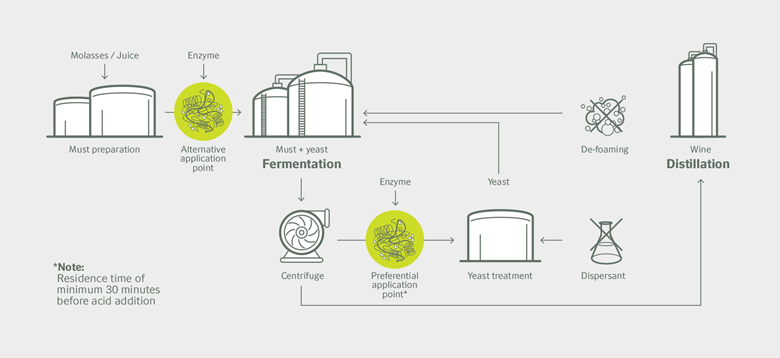Novozymes has launched the first ever biological foam control for sugcarcane ethanol called Fermax™. The enzyme protease replaces chemicals in the sugarcane ethanol production and prevents foam development during the fermentation process. According to Novozymes, ethanol plants that trialed Fermax experienced improved control as well as a cost reduction of up to 20 percent as compared to using chemicals.
“This is the first ever biological solution that prevents foam development during the fermentation process, which is a critical issue for producers,” said Daniel Cardinali, Novozymes’ head of sugarcane platform and biorefining for Latin America. “With Fermax, sugarcane ethanol producers can use sustainable enzyme technology to lower their costs, reduce the need for harsh chemicals, and increase the amount of ethanol they can produce in their fermentation tanks.”
Foam develops during the fermentation process as the yeast produces ethanol and carbon dioxide. The carbon dioxide creates foam, which can cause overflow of the fermentation tank and lead to production losses. Excessive foaming also forces plants to increase fermentation time and operate at lower capacity. To control this issues, a combination of anti-foam and dispersant chemicals are typically used to reduce the formation of foam, but their performance varies according to process and feedstock conditions.
Whereas according to Novozymes, Fermax delivers predictability and consistency. It helps stabilize the fermentation process to remove the variation seen in current, chemical-based technologies. The product does not remove the foam, rather it prevents foam from forming. The enzyme changes the foam structure by breaking down the stabilizing proteins to make it lighter and less dense. This enables better fermentation control, which allows producers to operate their plants more efficiently.
Fermax can completely replace, or work in combination with, traditional dispersant chemicals to boost their activity. Novozymes cites it can also save up to 70 percent of anti-foam chemicals. In addition, Fermax is easily applicable across a variety of plant configurations, i.e. continuous/batch fermentation and continuous/batch yeast treatment.
“This enzyme is a very cost-efficient solution, competitive with harsh chemicals, but without all their hidden costs, including supply issues, yeast damage, and incrustation,” Cardinali adds. “Sugarcane ethanol producers have traditionally not used enzymes. With Fermax, we start to apply the fascinating power of nature also within this growing industry to further improve production economics.”


